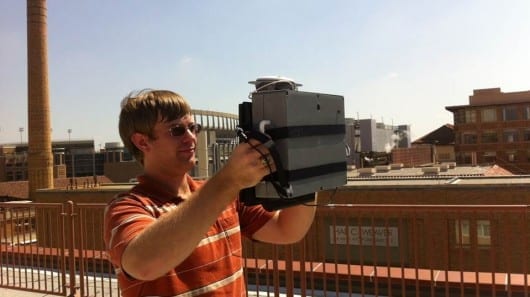
Todd Humphreys and his students at the University of Texas in Austin are tired of waiting for augmented reality that meets the promise of the technology we’ve been hearing about and seeing in science fiction for years now.
So they set out to build it themselves, and presented a very rough prototype for the first time at the South By Southwest Interactive Festival (SXSW) in Austin on Friday.
The prototype isn’t nearly as lightweight or wearable as Google’s Glass, the augmented reality spectacles that have received lots of buzz lately over their reported consumer release planned for later this year. Instead, it’s about the size of a desktop computer with a big, round antenna attached to the top of the box
But as Humphreys told the SXSW crowd, it’s not meant to be an elegantly designed consumer product, but rather a proof of concept for how good augmented reality could (and should) be.
“Google Glass is not the immersive experience I’m looking for,” Humphreys told the audience in a conference room of Austin’s downtown Omni Hotel.
He then laid out what he calls an augmented reality “Bill of Rights,” outlining what he sees as the real promise of AR, which includes a “true three-dimensional immersive experience” with virtual elements that look and behave as if real, creating a “convincing illusion.” Further, Humphreys wants to see absolute location registration (geolocation) accurate down to the centimeter, or even millimeter, no matter where a person is on the globe, outdoors and indoors.
Humphreys’ final demand for this next generation of augmented reality – it should be available soon; no waiting another decade for the experience Arnold Schwarzenegger and the Terminator series introduced us to in the last century.
AR Challenges
The assistant professor of engineering did acknowledge the loftiness of his AR ambitions and said he was willing to make a few concessions, namely that we may have to settle for a handheld AR experience in the short term rather than a totally immersive, wearable one. This is a point where he and his younger students are actually at odds – Humphreys believes it will be difficult for Google Glass and other “somewhat dorky hardware” to become socially acceptable, but his students disagree.
Humphreys also concedes that the suite of sensors in contemporary devices may be inadequate for achieving what he’s laid out in his AR Bill of Rights.
The Latest Bing News on:
Augmented reality
- Moline firefighters using new augmented reality trainingon May 8, 2024 at 8:42 pm
The device can simulate different types of fires in any room and tests the user on fire extinguisher technique.
- “Augmented History” brings Milwaukee’s ghost signs back to life in Historic Third Wardon May 8, 2024 at 12:54 pm
Milwaukee's Historic Third Ward is a booming arts & entertainment district, but while walking among the packed restaurants and modern ...
- Ordinary Glasses Could Soon Be Packed with AI, Hologram Tech Thanks to 3D Augmented Realityon May 8, 2024 at 10:14 am
Stanford researchers unveil AR systems using holography & AI, resembling ordinary glasses but offering vibrant 3D visuals.
- AI and holography bring 3D augmented reality to regular glasseson May 8, 2024 at 8:00 am
Researchers in the emerging field of spatial computing have developed a prototype augmented reality headset that uses holographic imaging to overlay full-color, 3D moving images on the lenses of what ...
- CORRECTION: VueReal Unveils ColourFusion(TM) microDisplay: A Revolution in Augmented Reality (AR) Display Technologyon May 8, 2024 at 7:20 am
This Press Release updates the headline which had a spelling error in the previous version Innovative AR Display Technology Combines Proprietary microLED and LCOS Advancements Enabled by VueReal's ...
- Automakers shift to extended reality in design processon May 8, 2024 at 6:19 am
Explore how the automotive industry is transforming its design process by incorporating extended reality for more efficient and innovative outcomes.
- How augmented reality is impacting securityon May 7, 2024 at 1:19 am
Apple launched its Apple Vision Pro to much fanfare and has pushed the discussion of augmented reality (AR) beyond the realms of gaming and entertainment. From healthcare innovations to retail ...
- Augmented Reality in Insurance Thematic Research Report 2024: Investments in Technology, Case Studies, AR Value Chain, Key Playerson May 2, 2024 at 11:14 pm
Dublin, May 03, 2024 (GLOBE NEWSWIRE) -- The "Augmented Reality in Insurance - Thematic Research" report has been added to ResearchAndMarkets.com's offering. This report provides an in-depth look at ...
- Shhh! 3 Secret Augmented Reality Stocks Flying Below Wall Street’s Radaron April 30, 2024 at 11:25 am
InvestorPlace - Stock Market News, Stock Advice & Trading Tips Virtual reality (VR), the metaverse, mixed or extended reality and spatial ...
- Augmented reality creation platform Trace launches with $2Mon April 25, 2024 at 10:09 am
Trace, a location-based augmented reality creation platform, today announced its launch with $2 million in funds led by Rev1 Ventures and Impellent Ventures to make it simple for businesses to bring ...
The Latest Google Headlines on:
Augmented reality
[google_news title=”” keyword=”augmented reality” num_posts=”10″ blurb_length=”0″ show_thumb=”left”] [/vc_column_text]The Latest Bing News on:
Immersive experience
- WW2 shelter could become immersive teaching spaceon May 9, 2024 at 1:05 am
Mr Thomas added that the shelter could become an immersive learning experience for children, "maybe taking themselves back to World War Two and imagining, when they're doing their diary extracts, what ...
- Mohegan Inspire offers cutting-edge digital media entertainment experienceon May 8, 2024 at 11:16 pm
It’s coming, the giant pink whale will appear in just a minute,” a young woman said to her child, pointing at the immersive digital entertainment street at Mohegan Inspire Entertainment Resort in ...
- LG TVS PIONEER IMMERSIVE AUDIO EXPERIENCE WITH APPLE MUSIC IN SPATIAL AUDIO WITH DOLBY ATMOSon May 8, 2024 at 9:12 pm
LG continues to elevate the audio experience with immersive sound and a diverse range of content. LG Smart TV users can effortlessly help users discover new features and services through the ...
- Best portable game consoles for an immersive gaming experience on the move: Top 5 picks for gamers on the moveon May 8, 2024 at 5:55 pm
Discover the ultimate companions for gaming on the go with our top 5 picks of portable game consoles. Whether you're a dedicated gamer or a casual player, find the perfect match to elevate your gaming ...
- The Magic of Immersive Disney Animation Las Vegason May 8, 2024 at 4:12 pm
Description: Do you love Disney or have a child who does? If you’re heading to Las Vegas, you’ll want to check out this incredible immersive experience at the Crystals shops near Aria. Immerse ...
- The Voice Coach Battle will debut in The Sandbox immersive game worldon May 8, 2024 at 3:30 pm
The Voice talent show is taking a leap into the metaverse with The Voice Coach Battle, a new show that will debut in The Sandbox.
- Apple Vision Pro will bring the MCU to new life with Marvel’s What If…? – An Immersive Storyon May 8, 2024 at 11:27 am
Thanks to the groundbreaking technology from the Apple Vision Pro, Marvel fans will cross between augmented and virtual reality as they interact in new worlds using their eyes and hands. As the ...
- Marvel Announces What If…? – An Immersive Storyon May 8, 2024 at 9:53 am
Marvel Studios has announced a brand-new interactive story based on the Marvel's What If...? Disney+ series. Aptly titled What If...? – An Immersive Story, it will be a mixed reality story that plays ...
- Disney's Making A Marvel Immersive Experience For Apple Vision Proon May 8, 2024 at 8:51 am
Apple's Vision Pro, launched earlier this year, needs new stand-out immersive experiences to make its promises of mixed reality futures feel more present. Disney just announced one, developed by ILM ...
- Immersive Gamebox eyes deeper international footprinton May 8, 2024 at 8:21 am
Off the back of 80% year-on-year growth in 2023 – which saw it reach its millionth player – immersive group gaming company, Immersive Gamebox, is announcing plans to significantly expand its in-person ...
The Latest Google Headlines on:
Immersive experience
[google_news title=”” keyword=”immersive experience” num_posts=”10″ blurb_length=”0″ show_thumb=”left”]










